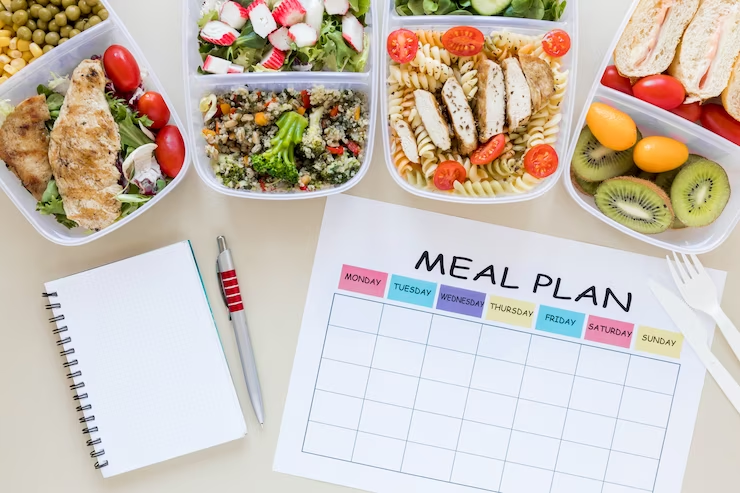Introduction:
Maintaining a healthy weight and leading a balanced lifestyle are key elements of overall well-being. If you're looking to achieve your health goals and make positive changes in your life, a calorie control meal plan is an excellent starting point. This comprehensive guide will walk you through the importance of calorie control, how to create a personalized meal plan, and the benefits of incorporating exercise into your routine. Let's embark on this journey together to transform your health and well-being!
Understanding the Importance of Caloric Intake: Before diving into the details of a calorie control meal plan, it's essential to understand the significance of caloric intake. The number of calories you consume plays a vital role in weight management and overall health. Here's how you can get started:
- Calculate Your Caloric Needs: Begin by determining your daily caloric requirements. Factors such as your age, gender, weight, and activity level impact the number of calories your body needs. You can use online calculators or consult a nutritionist to get accurate figures.
- Set Realistic Goals: Establish achievable weight management objectives that align with your health and lifestyle. It's crucial to set realistic and attainable goals, as gradual progress is more sustainable and effective in the long run.
- Track Your Intake: Keep a food journal or use mobile apps to monitor your daily caloric intake. This practice will help you become more aware of your eating habits and empower you to make mindful choices.
Creating Your Calorie Control Meal Plan: With a solid understanding of caloric intake, let's move on to creating your personalized calorie control meal plan. Here are the essential steps:
- Choose Nutrient-Rich Foods: Focus on incorporating nutrient-rich foods into your diet. Choose a diverse range of colorful fruits, vegetables, lean proteins, whole grains, and healthy fats. These options provide essential nutrients without excess calories.
- Practice Mindful Portion Control: Be mindful of your portion sizes to prevent overeating. Using smaller plates and eating slowly can help your body recognize when it's full, reducing the risk of consuming unnecessary calories.
- Embrace Meal Prep and Planning: Prepare your meals in advance to avoid impulsive, unhealthy choices. Planning your meals ensures you have nutritious options readily available, even on busy days.
Balancing Nutrition for Optimal Health: A calorie control meal plan isn't just about restricting calories; it's about nourishing your body with the right nutrients.Here's how you can achieve the perfect balance:
- Power Up with Protein: Incorporate adequate protein into your meals to support muscle maintenance and boost metabolism. Opt for sources like chicken, fish, tofu, beans, and nuts.
- Choose Smart Carbohydrates: Select complex carbohydrates that provide sustained energy throughout the day. Examples of these include sweet potatoes, quinoa, and whole-grain products.
- Include Healthy Fats: Don't shy away from healthy fats, as they are essential for nutrient absorption and overall health. Avocados, olive oil, and nuts are excellent sources of healthy fats.
Incorporating Exercise for Enhanced Results: A successful calorie control meal plan goes hand in hand with regular physical activity. Here's how you can make exercise a part of your routine:
- Discover Activities You Enjoy: Find physical activities that you genuinely enjoy doing. Whether it's dancing, swimming, cycling, or hiking, engaging in activities you love will make exercising more enjoyable and sustainable.
- Create a Workout Schedule: Establish a consistent exercise routine that includes cardiovascular activities, strength training, and flexibility exercises. This well-rounded approach will help you stay motivated and see better results.
- Stay Active Throughout the Day: Even if you have a sedentary job, take short breaks to stretch and move around. Every bit of movement contributes to burning calories and maintaining your overall well-being.
Making Calorie Control a Lifestyle Choice: To ensure long-term success, it's crucial to integrate calorie control into your lifestyle. Here are some tips to make it a sustainable habit:
- Stay Hydrated: Ensure you drink an ample amount of water throughout the day. Not only does staying hydrated support digestion, but it also helps reduce hunger and maintain overall health.
- Practice Mindful Eating: Be fully present during meals, savoring each bite. This approach aids in curbing overeating and fosters a healthier relationship with food.
- Reward Yourself Moderately: While it's essential to celebrate your achievements, avoid using food as the primary reward. Instead, find non-food-related ways to treat yourself and acknowledge your progress.
Conclusion:
Final Thoughts on Achieving Your Health Goals: Congratulations on taking the first step towards improving your health through a calorie control meal plan! Keep in mind that this journey is about growth, not perfection. Embrace the process, stay consistent, and be patient with yourself. With a well-crafted meal plan, balanced nutrition, regular exercise, and mindful choices, you'll be well on your way to achieving your health goals and living your best life.

